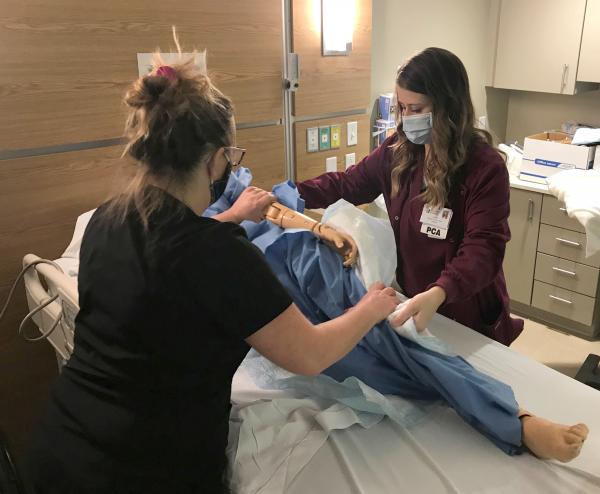CNA Classes Broken Down: What Every Future CNA Needs to Know
Wiki Article
Just How CNA Classes Can Assist You Launch a Successful Profession in the Medical Area
CNA classes function as a fundamental stepping rock for people desiring enter the clinical field. These programs convey important skills, consisting of efficient interaction and individual care methods. Students participate in hands-on training, connecting concept with functional application. As the need for health care specialists expands, the duty of a Certified Nursing Assistant ends up being significantly significant. This raises inquiries concerning the various occupation paths and development possibilities that lie in advance for those that finish their training.
Understanding the Duty of a Certified Nursing Assistant
The function of a Certified Nursing Assistant (CNA) is integral to the health care system, acting as a crucial web link in between clients and medical team. CNAs primarily assist people with day-to-day tasks such as showering, dressing, and consuming, guaranteeing their convenience and dignity. They are frequently the initial factor of get in touch with for people, giving vital emotional assistance and friendship. Along with personal care, CNAs are responsible for checking people' critical signs, reporting modifications in condition to nursing staff, and maintaining patient documents. Their jobs include ensuring sanitation in person settings and aiding with wheelchair. This function requires a caring disposition, strong interaction skills, and the ability to function effectively under pressure. By helping with a smooth operations within healthcare setups, CNAs play a considerable component in enhancing the overall individual experience and supporting the more comprehensive medical group in providing top quality treatment.Trick Abilities Acquired in CNA Classes
CNA classes furnish pupils with vital skills required for supplying top quality client care. One of the primary skills established works communication, allowing CNAs to interact compassionately with individuals and clearly relay information to health care teams. Students also find out important reasoning, which aids in examining patient requirements and responding suitably in numerous situations.Additionally, CNA programs stress individual treatment abilities, including aid with day-to-day living tasks such as showering, dressing, and feeding - CNA Classes. Infection control techniques are one more important part, guaranteeing that students recognize exactly how to preserve a safe atmosphere for both individuals and themselves
Additionally, students acquire understanding in standard clinical terms, assisting in better understanding of healthcare methods. Time administration abilities are grown to help CNAs focus on jobs successfully. Generally, these essential skills develop the structure for a successful career in the clinical area, preparing students to fulfill the diverse requirements of patients.

The Benefits of Hands-On Training
Acquiring practical experience through hands-on training is crucial for aspiring CNAs, as it connects the gap between theoretical expertise and real-world application. This immersive knowing approach enables trainees to create critical skills required for patient care, such as reliable communication, empathy, and technological capabilities. Engaging in real-life circumstances enables trainees to understand the characteristics of a healthcare setting, cultivating self-confidence in their capabilities.Hands-on training aids trainees become familiar with important devices and procedures, guaranteeing they are well-prepared for the difficulties of the task. It also provides chances to obtain immediate comments from trainers, boosting the learning experience. By working directly with clients under supervision, striving CNAs can develop their observational skills and find out to respond to various scenarios appropriately. Eventually, hands-on training furnishes these future medical care professionals with the proficiency and guarantee needed to do well in their functions.
Occupation Opportunities After Becoming a CNA
Various profession possibilities wait for individuals that finish their CNA training, opening up doors to numerous functions in the healthcare industry. Certified Nursing Assistants (CNAs) are vital members of the medical care team, giving direct client care in setups such as healthcare facilities, taking care of homes, and helped living facilities - CNA Classes. Their duties can include helping with daily living tasks, keeping an eye on important signs, and supplying emotional assistance to individualsPast traditional settings, CNAs might likewise find opportunities Full Article in specialized areas, such as recovery facilities or home health treatment. Furthermore, some might shift into roles in administrative assistance or person advocacy, leveraging their firsthand experience with people. The demand for CNAs remains to grow, driven by an aging populace and a boosted concentrate on quality client care. This high more information need assurances that people going into the field have a variety of alternatives to seek, making it an eye-catching entrance factor right into a fulfilling career in medical care.
Pathways for Development in the Healthcare Field
Development in the medical care area uses numerous pathways for individuals seeking to enhance their professions past the role of a Certified Nursing Assistant. After getting experience, many CNAs decide to go after additional education and learning and accreditations, such as coming to be an Accredited Nurse (LPN) or Nurse Practitioner (RN) This shift often entails registering in linking programs that acknowledge their current abilities.In addition, specialized qualifications in areas like geriatrics or pediatric medicines can open up doors to particular niche functions, improving both task complete satisfaction and wage potential. CNAs might additionally explore administrative placements, such as health and wellness treatment administration or client treatment coordination, which use their frontline experience in a different capacity.
In addition, continual specialist advancement through workshops and seminars can maintain CNAs updated on market requirements, making them more affordable prospects for innovation. The medical care area gives various opportunities for development, allowing CNAs to shape their profession trajectories properly.
Often Asked Questions

For How Long Do CNA Classes Usually Take to Total?
CNA classes generally take in between 4 to twelve weeks to complete, depending upon the program structure. Aspects such as program strength, scheduling, and the establishment's educational program design can influence the overall period of training.What Is the Price of CNA Training Programs?
The price of CNA training programs differs commonly, usually ranging from $300 to $2,000. Factors influencing this price consist of area, program length, and whether the training is offered through community universities or exclusive institutions.Are Online CNA Classes Available?
Online CNA classes are certainly available, providing versatility for trainees. Several organizations supply digital training, allowing individuals to finish coursework at their very own pace wikipedia reference while still fulfilling the needed needs for certification in nursing support.What Is the Qualification Exam Process Like?
The accreditation test procedure usually involves a written test reviewing understanding and a skills demonstration. Candidates need to pass both elements to become qualified, ensuring they satisfy the essential competencies required for nursing assistant duties.Do I Required Prior Healthcare Experience to Enlist in CNA Classes?
Prior medical care experience is not a requirement for registering in CNA classes. Individuals from various histories can get in the program, as it is designed to give comprehensive training and expertise necessary for effective accreditation and technique.Report this wiki page